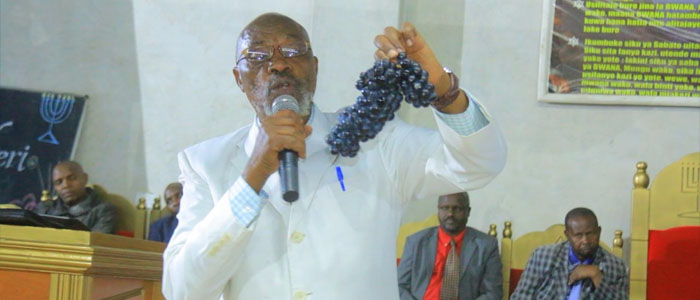
Introduction
Passover is an eight day feast that is kept to commemorate the miraculous deliverance of the children of Israel from slavery in Egypt.
Passover is an eight day feast that is kept to commemorate the miraculous deliverance of the children of Israel from slavery in Egypt.
Today is 13th of Abib, the first month of the biblical calendar (Exodus 12:1, and Deuteronomy 16:1). In the evening, it will be 14th of Abib, an appointed time when we present ourselves before Elohim Adonai (Deuteronomy 16:16). It is the time we celebrate the feast of Passover and the unleavened bread (Leviticus 23:5). This is the same night when Yahshua broke bread and took the cup to share the last supper with his disciples just before his arrest and death, more than 2000 years ago (Mathew 26:26). We celebrate it to commemorate the death and resurrection of Yahshua that brought salvation to mankind.

Passover is an eight day feast that is kept to commemorate the miraculous deliverance of the children of Israel from slavery in Egypt. We read in Exodus 12:1 how the liberation was connoted by applying blood of a lamb without blemish on the door posts of all Jewish houses. Any household in Egypt that did not have the saving power of the blood of a lamb on their door posts, experienced a deathblow of their firstborn sons and firstborns of their livestock. Similarly, our salvation is only achieved through the blood of Yahshua, the Lamb of God. This indicates how significant the blood of Yahshua is for our salvation. Anyone who does not receive Yahshua’s blood for his own salvation has no eternal life and is doomed for destruction when the day of the Lord comes.

The Passover lamb was roasted and eaten with unleavened bread and bitter herbs. They ate the unleavened bread, which is also known as Matzo. Matzo means “a coming out.” The Jews ate it because they were ready to come out of Egypt by the outstretched arm of Adonai. They ate it in readiness to leave and that is why there was not time for the dough to rise. Today, we eat the unleavened bread (Matzo) during this feast to remind us that we need to come out of sin and out of the world. As we shun from eating leavened products for the next eight days, let us understand that sin destroys our souls and we should therefore flee from it at all cost.
Yahshua was buried on the first day of the unleavened bread (15th Nisan) and resurrected three days later. He did not see corruption just as it had been prophesied in the scriptures. He is the bread of life that has no yeast (sin) in it. The unleavened bread (which is the body of Yahshua-the bread from heaven –John 6:35-40) and his blood represents our redemption. Therefore, by celebrating the Passover, we not only remember the night when the Israelites were protected by the blood of the lamb, but also it is a clear illustration of the sacrifice of Messiah Yahshua, the Lamb of God that takes away the sins of the world (John 1:29).
Yahshua introduced a new way of partaking the Passover. He instructed his disciples to eat unleavened bread representing his own body, and fresh juice from grapes representing his blood. This was symbolic of the new covenant that was given in his broken body and shed blood. We are therefore expected to remove the old leaven and to keep the feast in the newness of life. As we partake this feast, may it be meaningful to us. Let us recognize the priceless gift of the blood of Yahshua in our lives. Above all, let us walk in the newness of life, just like the way children of Israel left the old life of slavery in Egypt after eating the Passover.
Here in Kenya, we have camped at various centers in major towns throughout the country. There are also brethren in Tanzania, Malawi, South Africa, the United States and in Jerusalem Israel. I wish you a blessed feast and welcomes everyone to come and join us as we continue to seek Elohim during this joyous occasion.